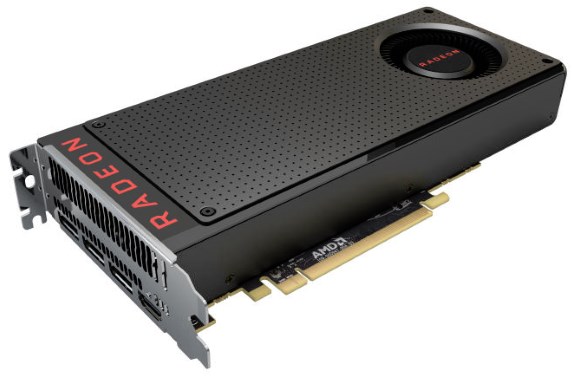The rumors about the availability of the 4GB model were true, it appears the only cards you can get this month are the $239 priced 8GB versions, the $199 4GB models will follow sometime next month. Only the reference-based cards are available today, custom models are anticipated within a week or two.
The Radeon RX 480 is based on the 14nm Polaris architecture, it features 2304 stream processors, 36 GCN compute units, 144 TMUs, 32 ROPs, and a 256-bit memory bus with 4GB or 8GB GDDR5 memory. The core is clocked at 1266MHz and the memory has a 8GHz effective clockspeed. Power is drawn from a single 6-pin PCIe power connector, the card has a 150W TDP and features three DisplayPort 1.4 outputs and one HDMI 2.0b output.
Lets take a look at some reviews to see what the press thinks about the highly anticipated RX 480. First up is a preview from AnandTech, they conclude that performance-wise, the Radeon RX 480 is slightly faster than the GeForce GTX 970 and the Radeon R9 390. Power efficiency is better than the previous generation but no match for NVIDIA's Pascal (in fact, it seems worse than Maxwell).
Looking at the overall performance picture, averaged across all of our games, the RX 480 lands a couple of percent ahead of NVIDIA’s popular GTX 970, and similarly ahead of AMD’s own Radeon R9 390, which is consistent with our performance expectations based on AMD’s earlier hints. This means that 970/390 performance has come down by around $90 since these cards were launched, from $329 to $239 for the more powerful RX 480 8GB. In the case of the AMD card power consumption is also down immensely as well, in essence offering Hawaii-like performance at around half of the power. However against the GTX 970 power consumption is a bit more of a mixed bag, and this is something to further address in our full review.Next we have a review from The Tech Report, they also found that the Radeon RX 480 8GB delivers performance in-line with the last-gen GeForce GTX 970, but at a significantly lower price. In some tests the RX 480 is a bit faster than the GTX 970, but sometimes it's a little slower.
The site praises the card for its consistently smooth frame delivery, an area where AMD used to trail NVIDIA, but complains that the power consumption and noise is higher than expected. AMD's often cited 2.8x performance/Watt improvement is far off the bat and the card also suffers from a poor stock cooler. It's quite loud at full load and the GPU gets pretty hot.
On the other hand, the RX 480's power consumption and noise figures aren't as rosy as we might have expected them to be. Our power consumption tests today aren't perfectly comparable to those in our older reviews, but one Radeon R9 290-powered system with a similar CPU and motherboard drew about 400W under load when we reviewed that graphics card as part of a larger test a while back. The Radeon RX 480 delivers similar performance to that card while shaving about 140W off the total power draw of our system. A 35% increase in efficiency is nothing to sniff at in chips of any type these days, but we were honestly hoping for more, given AMD's oft-repeated claim of a 2.8x performance-per-watt increase from Polaris chips.For a third perspective you can read this review at TechPowerUp. The site writes the Radeon RX 480 8GB has outstanding performance per dollar but has the same complaints about high noise, poor cooling and also the limited GPU overclocking potential:
The weakest point of AMD's reference design is certainly the thermal solution. It doesn't use any heatpipes or other high-tech means to keep the card cool. Rather, there is a big slab of metal, with a copper core that has the blower fan sending air across its fins. As a result we are seeing temperatures of up to 84°C, which has the effect that the card will clock down further to keep cool. On average our card ran 1239 MHz, which is in the upper range of AMD's rated 1120 - 1266 MHz clock window. What's even worse than the heat is the terrible fan noise. While idle noise is fine with 29 dBA (an idle-fan-off feature would still have been nice), in gaming the fan ramps up a lot, emitting 41 dBA noise during gaming (not Furmark).So to sum it all up, with the Radeon RX 480 you're getting previous-gen high-end (but not flagship) performance, previous-gen energy efficiency and poor cooling. The only thing making this worth buying is the low pricing, otherwise this card would fall flat on its face.
